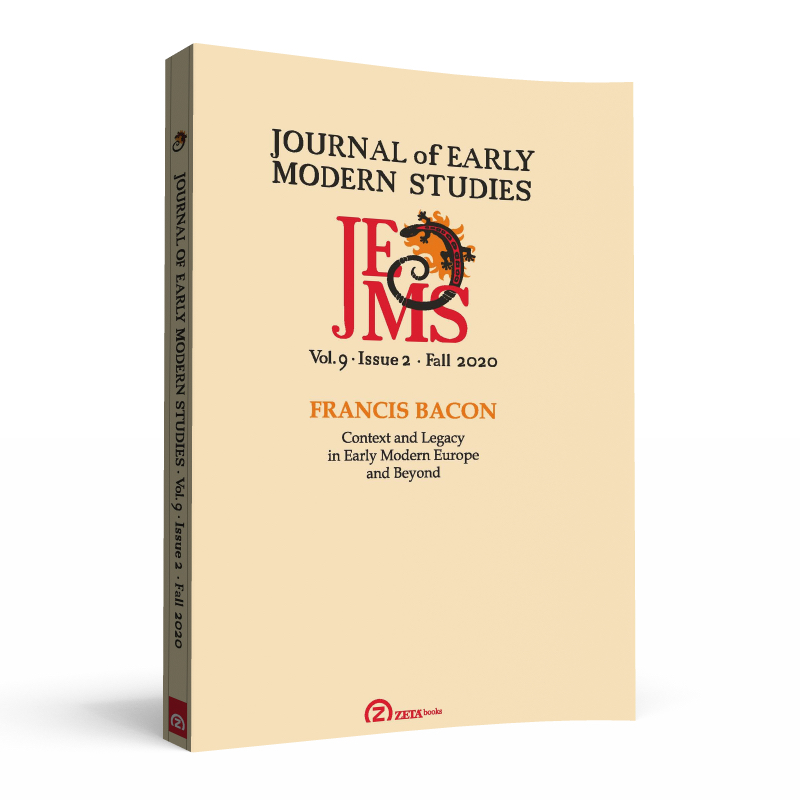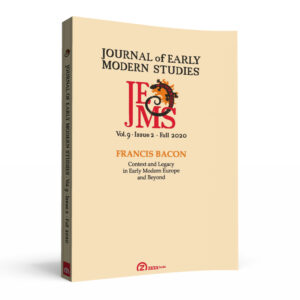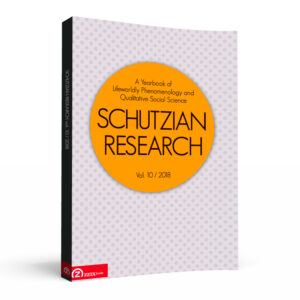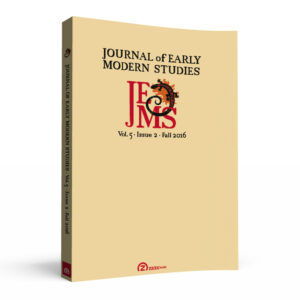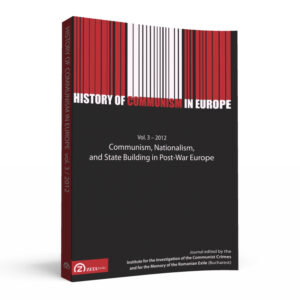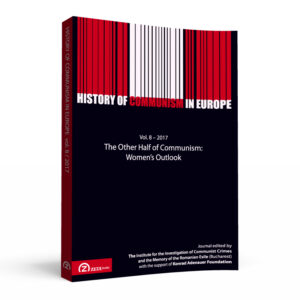CONTENTS:
ARTICLES
Claudia Dumitru, Francis Bacon and the Aristotelian tradition on the nature of sound
- Abstract: Centuries II and III of Francis Bacon’s posthumous natural history Sylva Sylvarum are largely dedicated to sound. This paper claims that Bacon’s investigation on this topic is fruitfully read against the background of the Aristotelian theory of sound, as presented in De anima commentaries. I argue that Bacon agreed with the general lines of this tradition in a crucial aspect: he rejected the reduction of sound to local motion. Many of the experimental instances and more theoretical remarks from his natural history of sound can be elucidated against this wider concern of distinguishing sound from motion, a theme that had been a staple of Aristotelian discussions of sound and hearing since the Middle Ages. Bacon admits that local motion is part of the efficient cause of sound, but he denies that it is its form, which means that sound cannot be reduced to a type of local motion. This position places him outside subsequent developments in natural philosophy in the seventeenth century.
Doina Cristina Rusu, Spiders, Ants, and Bees. Francis Bacon and the Methodology of Natural Philosophy
- Abstract: This paper argues that the methodology Francis Bacon used in his natural histories abides by the theoretical commitments presented in his methodological writings. On the one hand, Bacon advocated a middle way between idle speculation and mere gathering of facts. On the other hand, he took a strong stance against the theorisation based on very few facts. Using two of his sources whom Bacon takes to be the reflection of these two extremes—Giambattista della Porta as an instance of idle speculations, and Hugh Platt as an instance of gathering facts without extracting knowledge—I show how Bacon chose the middle way, which consists of gathering facts and gradually extracting theory out of them. In addition, it will become clear how Bacon used the expertise of contemporary practitioners to criticise fantastical theories and purge natural history of misconceived notions and false speculations.
Daniel Garber, Margaret Cavendish among the Baconians
- Abstract: Margaret Cavendish is a very difficult thinker to place in context. Given her stern critique of the “experimental philosophy” in the Observations on the Experimental Philosophy, one might be tempted to place Cavendish among the opponents of Francis Bacon and his experimental thought. But, I argue, her relation to Baconianism is much more subtle than that would suggest. I begin with an overview of Cavendish’s philosophical program, focusing mainly on her later natural philosophical thought in Philosophical and Physical Opinions (1663), Philosophical Letters (1664), Observations on the Experimental Philosophy (1666/68) and her Grounds of Natural Philosophy (1668). I then turn to Francis Bacon, and talk about how he understood his philosophical program in the 1620s, and how it had been transformed by later Baconians in the 1650s and 1660s. While Bacon held a vitalistic natural philosophy, what was most visible, particularly in Royal Society propaganda, was his experimentalism. But Margaret Cavendish’s natural philosophical program is, in a way, the exact contrary. While she was skeptical of Bacon’s experimentalism, she was an enthusiastic advocate for a vitalistic materialism that may well have been inspired, at least in part, by Bacon’s thought. Because of her opposition to the experimental philosophy, her contemporaries may not have seen her as a Baconian. But even so I think that she was a philosopher whom Bacon himself would have recognized as a kindred spirit.
Michael Deckard, Of the Beard of a Wild Oat: Hooke and Cavendish on the Senses of Plants
- Abstract: In 1665–1666, both Margaret Cavendish and Robert Hooke wrote about the beard of a wild oat. After looking through the microscope at the wild oat, Hooke describes the nature of what he is seeing in terms of a “small black or brown bristle” and believes that the microscope can improve the human senses. Cavendish responds to him regarding the seeing of the texture of a wild oat through the microscope and critiques his mechanistic explanation. This paper takes up the controversy between Cavendish and Hooke regarding the wild oat as two forms of a broadly Baconian enterprise. Challenging Lisa Walters and Eve Keller, who suppose that Cavendish was against the “Baconian enterprise as a whole,” the argument in this paper is that Cavendish is opposed to Hooke’s defense of instruments as recovering Edenic glory in the Micrographia, but not to the Baconian enterprise as a whole.
Silvia Manzo, Francis Bacon’s Quasi-Materialism and its Nineteenth-Century Reception (Joseph de Maistre and Karl Marx)
- Abstract: This paper will address the nineteenth-century reception of Bacon as an exponent of materialism in Joseph de Maistre and Karl Marx. I will argue that Bacon’s philosophy is “quasi-materialist.” The materialist components of his philosophy were noticed by de Maistre and Marx, who, in addition, pointed out a Baconian materialist heritage. Their construction of Bacon’s figure as the leader of a materialist lineage ascribed to his philosophy a revolutionary import that was contrary to Bacon’s actual leanings. This contrast shows how different the contexts were within which materialism was conceived and valued across the centuries, and how far philosophical and scientific discourses may be transformed by their receptions, to the point that in many cases they could hardly be embraced by the authors of these discourses.
REVIEW ARTICLE
Daian Bica, Causal Powers in the Framework of the Early Modernity [Benjamin Hill, Henrik Lagerlund, and Stathis Psillos (eds.), Reconsidering Causal Powers: Historical and Conceptual Perspectives, Oxford: Oxford University Press, 2021]
BOOK REVIEWS
- Dev Mahaffey: Emma Wilby, Invoking the Akelarre: Voices of the Accused in the Basque Witch-Craze, 1609–1614 (Chicago: Sussex Academic Press, 2019)
- Matteo Fornasier: Luca Addante, Tommaso Campanella, il filosofo immaginato, interpretato, falsato (Bari: Laterza, 2018)
ISSN: 2285-6382 (paperback)
ISSN: 2286–0290 (electronic)

